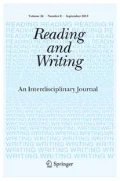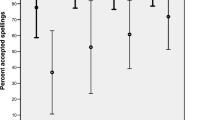Abstract
Children with dyslexia are believed to have very poor phonological skills for which they compensate, to some extent, through relatively well-developed knowledge of letter patterns. We tested this view in Study 1 by comparing 25 dyslexic children and 25 younger normal children, chosen so that both groups performed, on average, at a second-grade spelling level. Phonological skill was assessed using phoneme counting and nonword spelling tasks. Knowledge of legal and illegal letter patterns was tested using a spelling choice task. The dyslexic children and the younger nondyslexic children performed similarly on all the tasks, and they had difficulty, for the most part, with the same linguistic structures. Supporting the idea that older dyslexics’ spellings are quite similar to those of typical beginners, we found in Study 2 that experienced teachers could not differentiate between the two groups based on their spellings.
Similar content being viewed by others
References
E. Boder (1973) ArticleTitleDevelopmental dyslexia: A diagnostic approach based on three atypical reading-spelling patterns Developmental Medicine and Child Neurology 15 663–687
D. Bourassa R. Treiman (2003) ArticleTitleSpelling in children with dyslexia: Analyses from the Treiman-Bourassa Early Spelling Test Scientific Studies of Reading 7 309–333
L. Bradley P. E. Bryant (1978) ArticleTitleDifficulties in auditory organisation as a possible cause of reading backwardness Nature 271 746–747
M. Bruck (1992) ArticleTitlePersistence of dyslexics’ phonological awareness deficits Developmental Psychology 28 874–886
M. Bruck R. Treiman (1990) ArticleTitlePhonological awareness and spelling in normal children and dyslexics: The case of initial consonant clusters Journal of Experimental Child Psychology 50 156–178
M. Bruck R. Treiman M. Caravolas F. Genesee M. Cassar (1998) ArticleTitleSpelling skills of children in whole language and phonics classrooms Applied Psycholinguistics 19 669–684
L. C. Ehri (1998) Grapheme–phoneme knowledge is essential for learning to read words in English J. L. Metsala L. C. Ehri (Eds) Word recognition in beginning literacy Erlbaum Mahwah, NJ 3–40
U. Frith (1985) Beneath the surface of developmental dyslexia K. E. Patterson J. C. Marshall M. Coltheart (Eds) Surface dyslexia: Neuropsychological and cognitive studies of phonological reading Erlbaum Hove, England 301–330
U. Goswami (1992) ArticleTitlePhonological factors in spelling development Journal of Child Psychology & Psychiatry & Allied Disciplines 33 967–975
International Phonetic Association. (1996). Reproduction of The International Phonetic Alphabet. Retrieved from http://www2.arts.gla.ac.uk/IPA/ipachart.html.
International Phonetic Association. (1999). Handbook of the International Phonetic Association: A guide to the use of the International Phonetic Alphabet. Cambridge, England: Cambridge University Press.
M. Invernizzi M. J. Worthy (1989) ArticleTitleAn orthographic-specific comparison of the spelling errors of learning disabled and normal children across four grade levels of spelling achievement Reading Psychology 10 173–188
L. C. Moats (1983) ArticleTitleA comparison of the spelling errors of older dyslexic and second-grade normal children Annals of Dyslexia 33 121–140
R. D. Morris K. K. Stuebing J. M. Fletcher S. E. Shaywitz G. R. Lyon D.P. Shankweiler L. Katz D. J. Francis B. A. Shaywitz (1998) ArticleTitleSubtypes of reading disability: Variability around a phonological core Journal of Educational Psychology 90 347–373
H. E. Nelson (1980) Analysis of spelling errors in normal and dyslexic children U. Frith (Eds) Cognitive processes in spelling Academic Press London 475–493
R. K. Olson (1985) Disabled reading processes and cognitive profiles D. B. Gray J. F. Kavanagh (Eds) Biobehavioral measures of dyslexia York Press Baltimore 215–243
B. F. Pennington L. L. McCabe S. D. Smith D. L. Lefly M. O. Bookman W. J. Kimberling et al. (1986) ArticleTitleSpelling errors in adults with a form of familial dyslexia Child Development 57 1001–1013
C. A. Perfetti (1992) The representation problem in reading acquisition P. B. Gough L. C. Ehri R. Treiman (Eds) Reading acquisition Erlbaum Hillsdale, NJ 145–174
J. P. Rack M. J. Snowling R. K. Olson (1992) ArticleTitleThe nonword reading deficit in developmental dyslexia: A review Reading Research Quarterly 27 29–53
C. Read (1986) Children’s creative spelling Routledge & Kegan Paul London
D. L. Share (1996) Deficient phonological processing in disabled readers implicates processing deficits beyond the phonological module K. P. van den Bos L. S. Siegel D. J. Bakker D. L. Share (Eds) Current directions in dyslexia research Swets & Zeitlinger Lisse, Netherlands 149–167
L. S. Siegel D. Share E. Geva (1995) ArticleTitleEvidence for superior orthographic skills in dyslexics Psychological Science 6 250–254
K. E. Stanovich L. S. Siegel A. Gottardo (1997) ArticleTitleConverging evidence for phonological and surface subtypes of reading disability Journal of Educational Psychology 89 114–127
R. Treiman (1993) Beginning to spell: A study of first-grade children Oxford University Press New York
M. H. van IJzendoorn A. G. Bus (1994) ArticleTitleMeta-analytic confirmation of the nonword reading deficit in developmental dyslexia Reading Research Quarterly 29 267–275
M. D. Vernon (1957) Backwardness in reading: A study of its nature and origin Cambridge University Press Cambridge, England
G. S. Wilkinson (1993) The Wide Range Achievement Test 3 Wide Range, Inc Wilmington, DE
Author information
Authors and Affiliations
Corresponding author
Rights and permissions
About this article
Cite this article
Cassar, M., Treiman, R., Moats, L. et al. How do the spellings of children with dyslexia compare with those of nondyslexic children?. Read Writ 18, 27–49 (2005). https://doi.org/10.1007/s11145-004-2345-x
Issue Date:
DOI: https://doi.org/10.1007/s11145-004-2345-x




